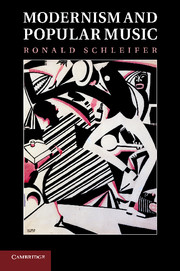Book contents
- Frontmatter
- Contents
- List of Figures
- Preface
- Acknowledgments
- Introduction: popular music and the experience of modernism
- PART I MUSICAL MODERNISM: POPULAR MUSIC IN THE TIME OF JAZZ
- PART II GERSHWIN, PORTER, WALLER, AND HOLIDAY
- Conclusion: popular music and the revolution of the word
- Notes
- Bibliography
- Index
Conclusion: popular music and the revolution of the word
Published online by Cambridge University Press: 05 July 2011
- Frontmatter
- Contents
- List of Figures
- Preface
- Acknowledgments
- Introduction: popular music and the experience of modernism
- PART I MUSICAL MODERNISM: POPULAR MUSIC IN THE TIME OF JAZZ
- PART II GERSHWIN, PORTER, WALLER, AND HOLIDAY
- Conclusion: popular music and the revolution of the word
- Notes
- Bibliography
- Index
Summary
Throughout Modernism and Popular Music I have noted the ways that popular music is, in many ways, essentially performative, and in the Introduction I argued that the interpretive disciplines of the human sciences are particularly well positioned to engage with such performativity. I also suggested that such “interpretive disciplines” in important ways emerged within cultural modernism. Colin MacCabe's study, James Joyce and the Revolution of the Word, taking its title from Eugene Jolas's manifesto published in transition in 1929, situates Joyce at the heart of the modernist “revolution” that, as I mentioned earlier, made engagement with performance rather than the comprehension of authorial meaning its signal manner of comprehension. “Instead of constructing a meaning,” MacCabe argues, “Joyce's texts concern themselves with the position of the subject in language,” and such positioning, he claims, follows from the “fact that meaning is distributed through material and is constantly, therefore, open to further interpretations” (15). This performative engagement – shared with other modernist disciplines such as psychology, sociology, dialogics – is a function of grasping the materiality of language, as opposed to its “transcendental” meanings which, like Bach's music, seem independent of time, place, and the “accidents” of performance. Moreover, the “further interpretations” of performance entail kinds of active rewriting we have encountered in the Gershwins and Porter taking up popular forms, and the “jazz” of Waller and Holiday re-singing them.
- Type
- Chapter
- Information
- Modernism and Popular Music , pp. 176 - 179Publisher: Cambridge University PressPrint publication year: 2011



